Hilton Hotel: Emotional Intelligence and Employee Performance
VerifiedAdded on 2023/06/04
|21
|5378
|329
Report
AI Summary
This report presents a research study on the relationship between emotional intelligence (EI) and employee performance, with a specific focus on the Hilton Hotel chain. The introduction highlights the importance of EI and job satisfaction in the modern workplace, setting the stage for an investigation into the factors that influence these aspects. The literature review delves into the concepts, definitions, theories, and models of EI, including the mixed model and its various components such as self-awareness, self-regulation, social skills, empathy, and internal motivation. It also explores theories of employee performance and job satisfaction, such as Herzberg’s two-factor theory, and examines existing empirical research on EI in the hospitality industry. The methodology section outlines the research approach, data collection methods, sampling techniques, and data analysis procedures. The report aims to identify the relationship between EI and employee performance and to assess strategies for improvement. The conclusion and recommendations offer insights based on the research findings, addressing weaknesses, limitations, and providing a time schedule for the study. The report emphasizes the significance of EI in the hospitality sector, providing benefits to managers and employees, and the potential for EI to be a learned skill.
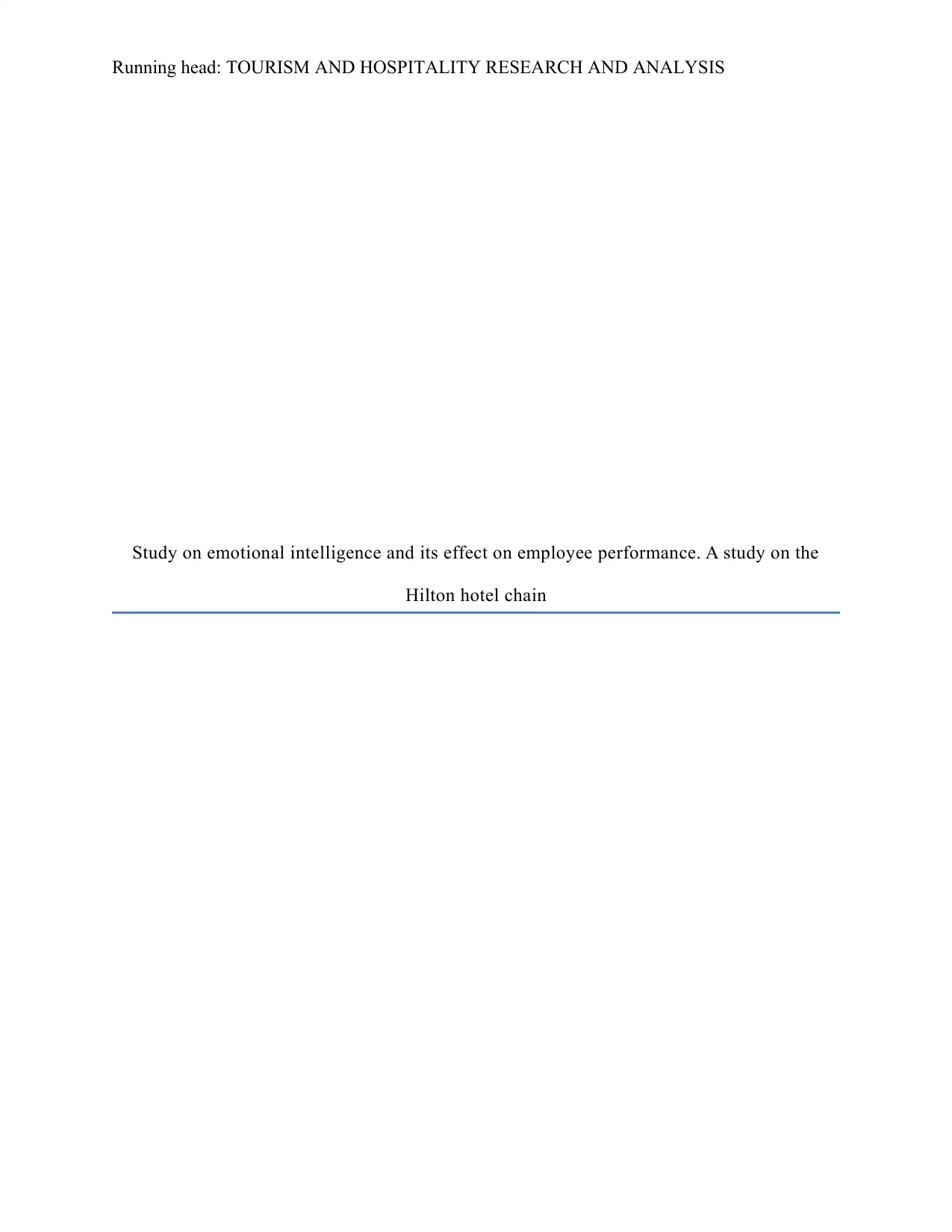
Running head: TOURISM AND HOSPITALITY RESEARCH AND ANALYSIS
Study on emotional intelligence and its effect on employee performance. A study on the
Hilton hotel chain
Study on emotional intelligence and its effect on employee performance. A study on the
Hilton hotel chain
Paraphrase This Document
Need a fresh take? Get an instant paraphrase of this document with our AI Paraphraser
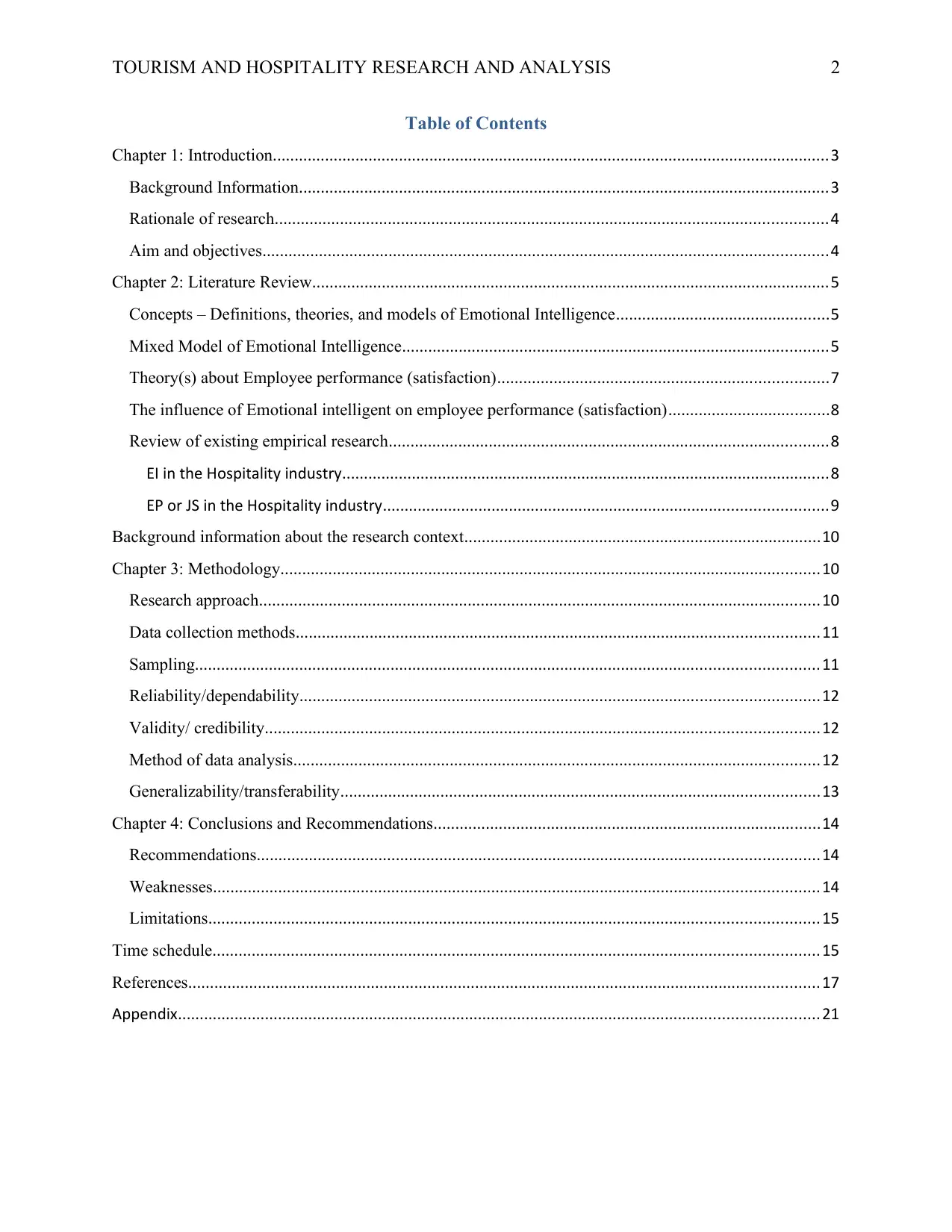
TOURISM AND HOSPITALITY RESEARCH AND ANALYSIS 2
Table of Contents
Chapter 1: Introduction................................................................................................................................3
Background Information..........................................................................................................................3
Rationale of research...............................................................................................................................4
Aim and objectives..................................................................................................................................4
Chapter 2: Literature Review.......................................................................................................................5
Concepts – Definitions, theories, and models of Emotional Intelligence.................................................5
Mixed Model of Emotional Intelligence..................................................................................................5
Theory(s) about Employee performance (satisfaction)............................................................................7
The influence of Emotional intelligent on employee performance (satisfaction).....................................8
Review of existing empirical research.....................................................................................................8
EI in the Hospitality industry................................................................................................................8
EP or JS in the Hospitality industry......................................................................................................9
Background information about the research context..................................................................................10
Chapter 3: Methodology............................................................................................................................10
Research approach.................................................................................................................................10
Data collection methods........................................................................................................................11
Sampling...............................................................................................................................................11
Reliability/dependability.......................................................................................................................12
Validity/ credibility...............................................................................................................................12
Method of data analysis.........................................................................................................................12
Generalizability/transferability..............................................................................................................13
Chapter 4: Conclusions and Recommendations.........................................................................................14
Recommendations.................................................................................................................................14
Weaknesses...........................................................................................................................................14
Limitations............................................................................................................................................15
Time schedule...........................................................................................................................................15
References.................................................................................................................................................17
Appendix...................................................................................................................................................21
Table of Contents
Chapter 1: Introduction................................................................................................................................3
Background Information..........................................................................................................................3
Rationale of research...............................................................................................................................4
Aim and objectives..................................................................................................................................4
Chapter 2: Literature Review.......................................................................................................................5
Concepts – Definitions, theories, and models of Emotional Intelligence.................................................5
Mixed Model of Emotional Intelligence..................................................................................................5
Theory(s) about Employee performance (satisfaction)............................................................................7
The influence of Emotional intelligent on employee performance (satisfaction).....................................8
Review of existing empirical research.....................................................................................................8
EI in the Hospitality industry................................................................................................................8
EP or JS in the Hospitality industry......................................................................................................9
Background information about the research context..................................................................................10
Chapter 3: Methodology............................................................................................................................10
Research approach.................................................................................................................................10
Data collection methods........................................................................................................................11
Sampling...............................................................................................................................................11
Reliability/dependability.......................................................................................................................12
Validity/ credibility...............................................................................................................................12
Method of data analysis.........................................................................................................................12
Generalizability/transferability..............................................................................................................13
Chapter 4: Conclusions and Recommendations.........................................................................................14
Recommendations.................................................................................................................................14
Weaknesses...........................................................................................................................................14
Limitations............................................................................................................................................15
Time schedule...........................................................................................................................................15
References.................................................................................................................................................17
Appendix...................................................................................................................................................21
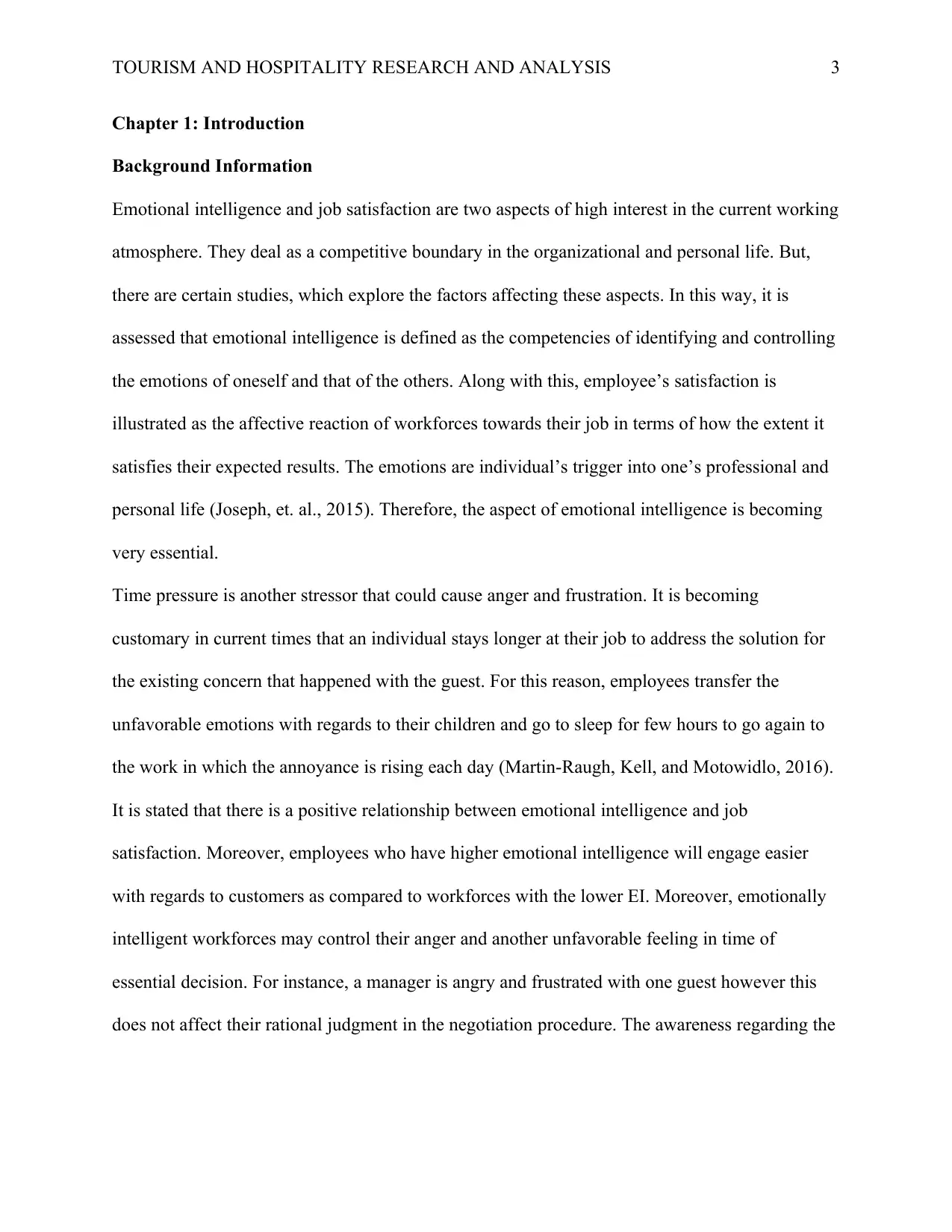
TOURISM AND HOSPITALITY RESEARCH AND ANALYSIS 3
Chapter 1: Introduction
Background Information
Emotional intelligence and job satisfaction are two aspects of high interest in the current working
atmosphere. They deal as a competitive boundary in the organizational and personal life. But,
there are certain studies, which explore the factors affecting these aspects. In this way, it is
assessed that emotional intelligence is defined as the competencies of identifying and controlling
the emotions of oneself and that of the others. Along with this, employee’s satisfaction is
illustrated as the affective reaction of workforces towards their job in terms of how the extent it
satisfies their expected results. The emotions are individual’s trigger into one’s professional and
personal life (Joseph, et. al., 2015). Therefore, the aspect of emotional intelligence is becoming
very essential.
Time pressure is another stressor that could cause anger and frustration. It is becoming
customary in current times that an individual stays longer at their job to address the solution for
the existing concern that happened with the guest. For this reason, employees transfer the
unfavorable emotions with regards to their children and go to sleep for few hours to go again to
the work in which the annoyance is rising each day (Martin-Raugh, Kell, and Motowidlo, 2016).
It is stated that there is a positive relationship between emotional intelligence and job
satisfaction. Moreover, employees who have higher emotional intelligence will engage easier
with regards to customers as compared to workforces with the lower EI. Moreover, emotionally
intelligent workforces may control their anger and another unfavorable feeling in time of
essential decision. For instance, a manager is angry and frustrated with one guest however this
does not affect their rational judgment in the negotiation procedure. The awareness regarding the
Chapter 1: Introduction
Background Information
Emotional intelligence and job satisfaction are two aspects of high interest in the current working
atmosphere. They deal as a competitive boundary in the organizational and personal life. But,
there are certain studies, which explore the factors affecting these aspects. In this way, it is
assessed that emotional intelligence is defined as the competencies of identifying and controlling
the emotions of oneself and that of the others. Along with this, employee’s satisfaction is
illustrated as the affective reaction of workforces towards their job in terms of how the extent it
satisfies their expected results. The emotions are individual’s trigger into one’s professional and
personal life (Joseph, et. al., 2015). Therefore, the aspect of emotional intelligence is becoming
very essential.
Time pressure is another stressor that could cause anger and frustration. It is becoming
customary in current times that an individual stays longer at their job to address the solution for
the existing concern that happened with the guest. For this reason, employees transfer the
unfavorable emotions with regards to their children and go to sleep for few hours to go again to
the work in which the annoyance is rising each day (Martin-Raugh, Kell, and Motowidlo, 2016).
It is stated that there is a positive relationship between emotional intelligence and job
satisfaction. Moreover, employees who have higher emotional intelligence will engage easier
with regards to customers as compared to workforces with the lower EI. Moreover, emotionally
intelligent workforces may control their anger and another unfavorable feeling in time of
essential decision. For instance, a manager is angry and frustrated with one guest however this
does not affect their rational judgment in the negotiation procedure. The awareness regarding the
⊘ This is a preview!⊘
Do you want full access?
Subscribe today to unlock all pages.

Trusted by 1+ million students worldwide
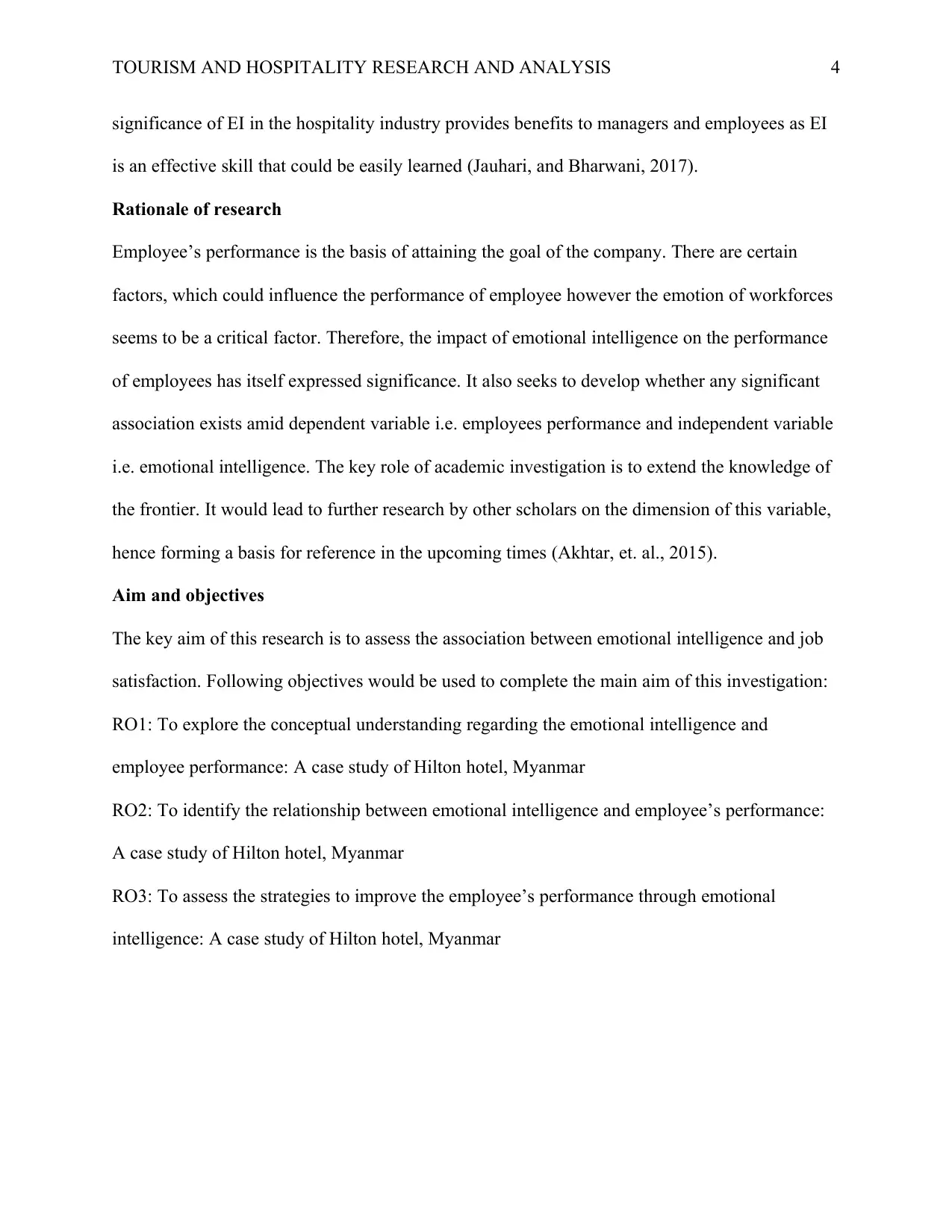
TOURISM AND HOSPITALITY RESEARCH AND ANALYSIS 4
significance of EI in the hospitality industry provides benefits to managers and employees as EI
is an effective skill that could be easily learned (Jauhari, and Bharwani, 2017).
Rationale of research
Employee’s performance is the basis of attaining the goal of the company. There are certain
factors, which could influence the performance of employee however the emotion of workforces
seems to be a critical factor. Therefore, the impact of emotional intelligence on the performance
of employees has itself expressed significance. It also seeks to develop whether any significant
association exists amid dependent variable i.e. employees performance and independent variable
i.e. emotional intelligence. The key role of academic investigation is to extend the knowledge of
the frontier. It would lead to further research by other scholars on the dimension of this variable,
hence forming a basis for reference in the upcoming times (Akhtar, et. al., 2015).
Aim and objectives
The key aim of this research is to assess the association between emotional intelligence and job
satisfaction. Following objectives would be used to complete the main aim of this investigation:
RO1: To explore the conceptual understanding regarding the emotional intelligence and
employee performance: A case study of Hilton hotel, Myanmar
RO2: To identify the relationship between emotional intelligence and employee’s performance:
A case study of Hilton hotel, Myanmar
RO3: To assess the strategies to improve the employee’s performance through emotional
intelligence: A case study of Hilton hotel, Myanmar
significance of EI in the hospitality industry provides benefits to managers and employees as EI
is an effective skill that could be easily learned (Jauhari, and Bharwani, 2017).
Rationale of research
Employee’s performance is the basis of attaining the goal of the company. There are certain
factors, which could influence the performance of employee however the emotion of workforces
seems to be a critical factor. Therefore, the impact of emotional intelligence on the performance
of employees has itself expressed significance. It also seeks to develop whether any significant
association exists amid dependent variable i.e. employees performance and independent variable
i.e. emotional intelligence. The key role of academic investigation is to extend the knowledge of
the frontier. It would lead to further research by other scholars on the dimension of this variable,
hence forming a basis for reference in the upcoming times (Akhtar, et. al., 2015).
Aim and objectives
The key aim of this research is to assess the association between emotional intelligence and job
satisfaction. Following objectives would be used to complete the main aim of this investigation:
RO1: To explore the conceptual understanding regarding the emotional intelligence and
employee performance: A case study of Hilton hotel, Myanmar
RO2: To identify the relationship between emotional intelligence and employee’s performance:
A case study of Hilton hotel, Myanmar
RO3: To assess the strategies to improve the employee’s performance through emotional
intelligence: A case study of Hilton hotel, Myanmar
Paraphrase This Document
Need a fresh take? Get an instant paraphrase of this document with our AI Paraphraser
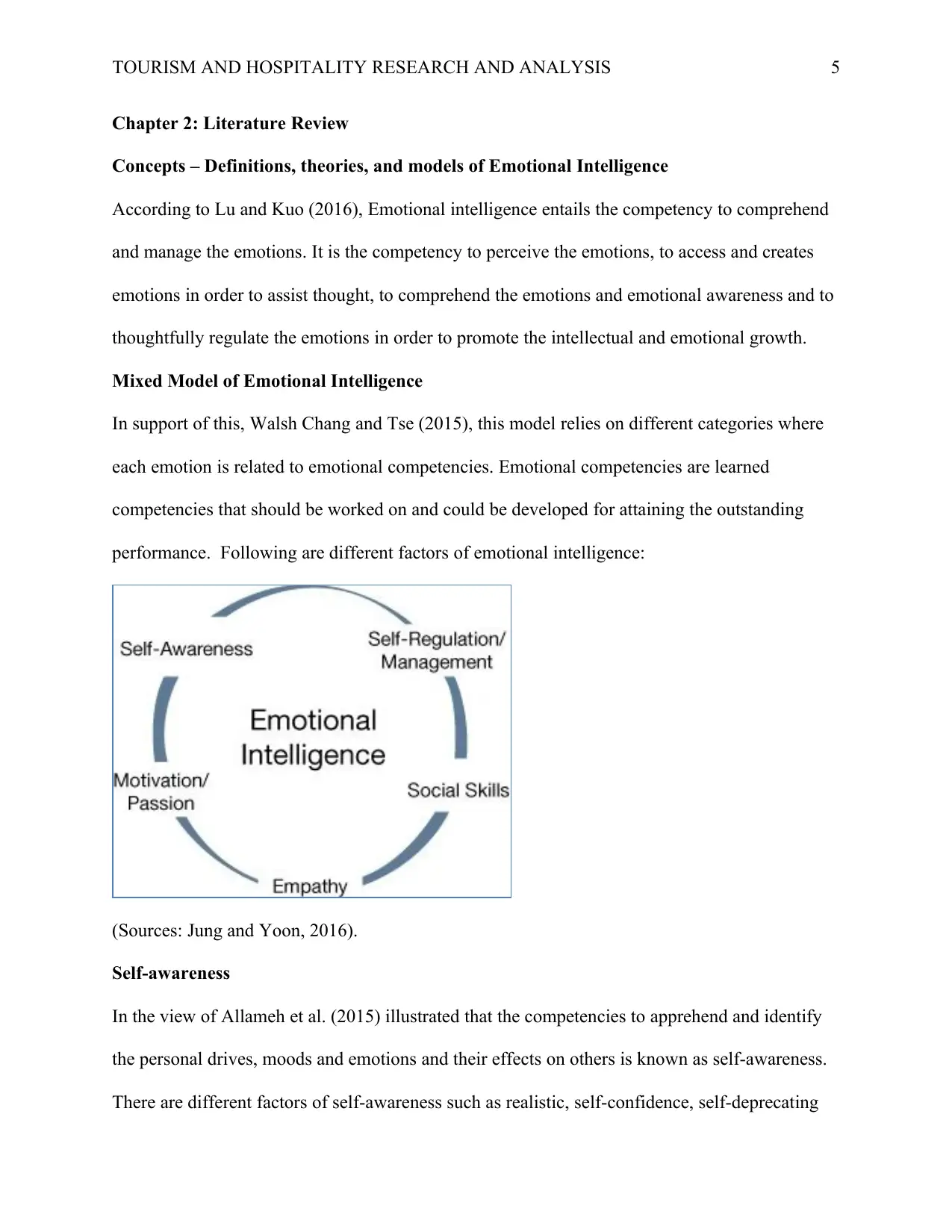
TOURISM AND HOSPITALITY RESEARCH AND ANALYSIS 5
Chapter 2: Literature Review
Concepts – Definitions, theories, and models of Emotional Intelligence
According to Lu and Kuo (2016), Emotional intelligence entails the competency to comprehend
and manage the emotions. It is the competency to perceive the emotions, to access and creates
emotions in order to assist thought, to comprehend the emotions and emotional awareness and to
thoughtfully regulate the emotions in order to promote the intellectual and emotional growth.
Mixed Model of Emotional Intelligence
In support of this, Walsh Chang and Tse (2015), this model relies on different categories where
each emotion is related to emotional competencies. Emotional competencies are learned
competencies that should be worked on and could be developed for attaining the outstanding
performance. Following are different factors of emotional intelligence:
(Sources: Jung and Yoon, 2016).
Self-awareness
In the view of Allameh et al. (2015) illustrated that the competencies to apprehend and identify
the personal drives, moods and emotions and their effects on others is known as self-awareness.
There are different factors of self-awareness such as realistic, self-confidence, self-deprecating
Chapter 2: Literature Review
Concepts – Definitions, theories, and models of Emotional Intelligence
According to Lu and Kuo (2016), Emotional intelligence entails the competency to comprehend
and manage the emotions. It is the competency to perceive the emotions, to access and creates
emotions in order to assist thought, to comprehend the emotions and emotional awareness and to
thoughtfully regulate the emotions in order to promote the intellectual and emotional growth.
Mixed Model of Emotional Intelligence
In support of this, Walsh Chang and Tse (2015), this model relies on different categories where
each emotion is related to emotional competencies. Emotional competencies are learned
competencies that should be worked on and could be developed for attaining the outstanding
performance. Following are different factors of emotional intelligence:
(Sources: Jung and Yoon, 2016).
Self-awareness
In the view of Allameh et al. (2015) illustrated that the competencies to apprehend and identify
the personal drives, moods and emotions and their effects on others is known as self-awareness.
There are different factors of self-awareness such as realistic, self-confidence, self-deprecating
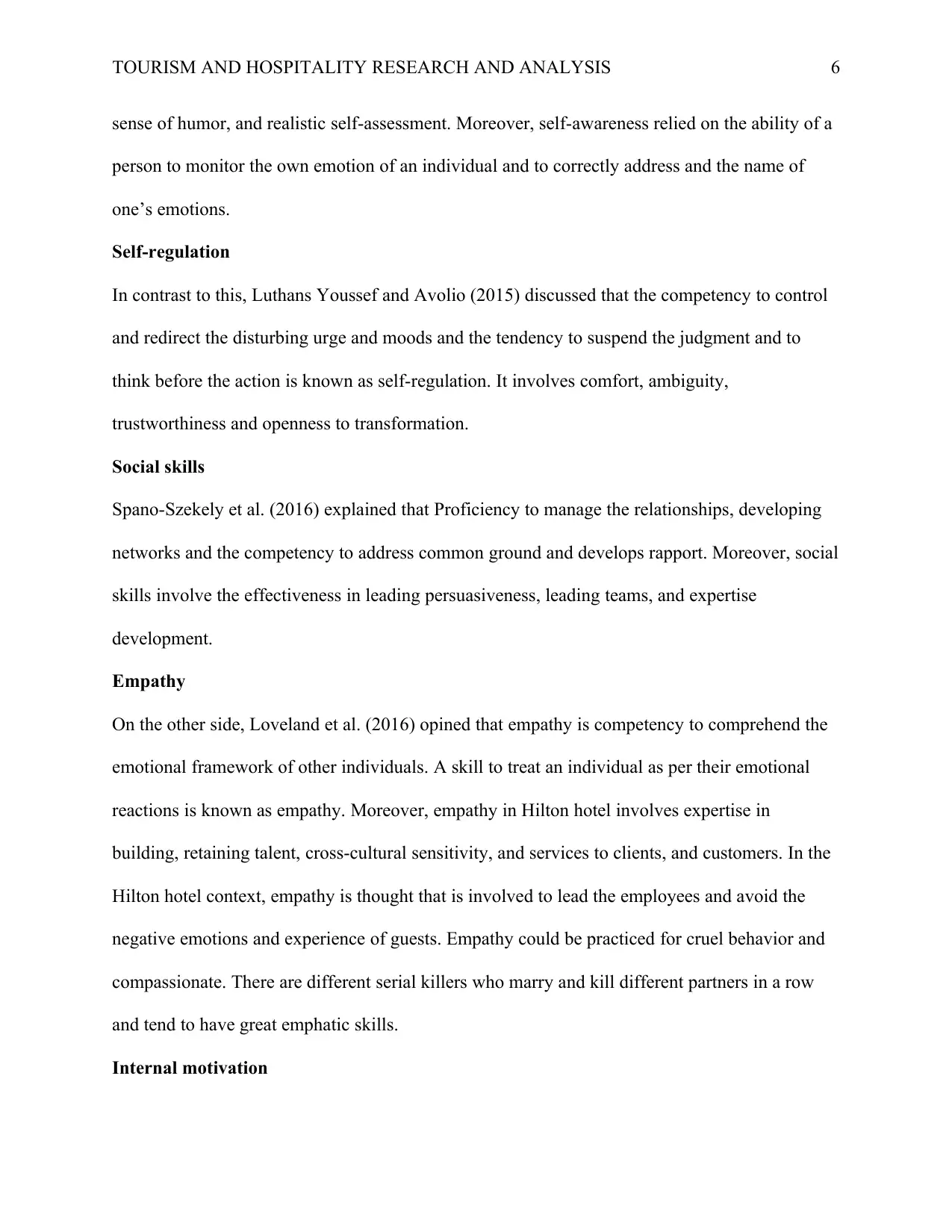
TOURISM AND HOSPITALITY RESEARCH AND ANALYSIS 6
sense of humor, and realistic self-assessment. Moreover, self-awareness relied on the ability of a
person to monitor the own emotion of an individual and to correctly address and the name of
one’s emotions.
Self-regulation
In contrast to this, Luthans Youssef and Avolio (2015) discussed that the competency to control
and redirect the disturbing urge and moods and the tendency to suspend the judgment and to
think before the action is known as self-regulation. It involves comfort, ambiguity,
trustworthiness and openness to transformation.
Social skills
Spano-Szekely et al. (2016) explained that Proficiency to manage the relationships, developing
networks and the competency to address common ground and develops rapport. Moreover, social
skills involve the effectiveness in leading persuasiveness, leading teams, and expertise
development.
Empathy
On the other side, Loveland et al. (2016) opined that empathy is competency to comprehend the
emotional framework of other individuals. A skill to treat an individual as per their emotional
reactions is known as empathy. Moreover, empathy in Hilton hotel involves expertise in
building, retaining talent, cross-cultural sensitivity, and services to clients, and customers. In the
Hilton hotel context, empathy is thought that is involved to lead the employees and avoid the
negative emotions and experience of guests. Empathy could be practiced for cruel behavior and
compassionate. There are different serial killers who marry and kill different partners in a row
and tend to have great emphatic skills.
Internal motivation
sense of humor, and realistic self-assessment. Moreover, self-awareness relied on the ability of a
person to monitor the own emotion of an individual and to correctly address and the name of
one’s emotions.
Self-regulation
In contrast to this, Luthans Youssef and Avolio (2015) discussed that the competency to control
and redirect the disturbing urge and moods and the tendency to suspend the judgment and to
think before the action is known as self-regulation. It involves comfort, ambiguity,
trustworthiness and openness to transformation.
Social skills
Spano-Szekely et al. (2016) explained that Proficiency to manage the relationships, developing
networks and the competency to address common ground and develops rapport. Moreover, social
skills involve the effectiveness in leading persuasiveness, leading teams, and expertise
development.
Empathy
On the other side, Loveland et al. (2016) opined that empathy is competency to comprehend the
emotional framework of other individuals. A skill to treat an individual as per their emotional
reactions is known as empathy. Moreover, empathy in Hilton hotel involves expertise in
building, retaining talent, cross-cultural sensitivity, and services to clients, and customers. In the
Hilton hotel context, empathy is thought that is involved to lead the employees and avoid the
negative emotions and experience of guests. Empathy could be practiced for cruel behavior and
compassionate. There are different serial killers who marry and kill different partners in a row
and tend to have great emphatic skills.
Internal motivation
⊘ This is a preview!⊘
Do you want full access?
Subscribe today to unlock all pages.

Trusted by 1+ million students worldwide
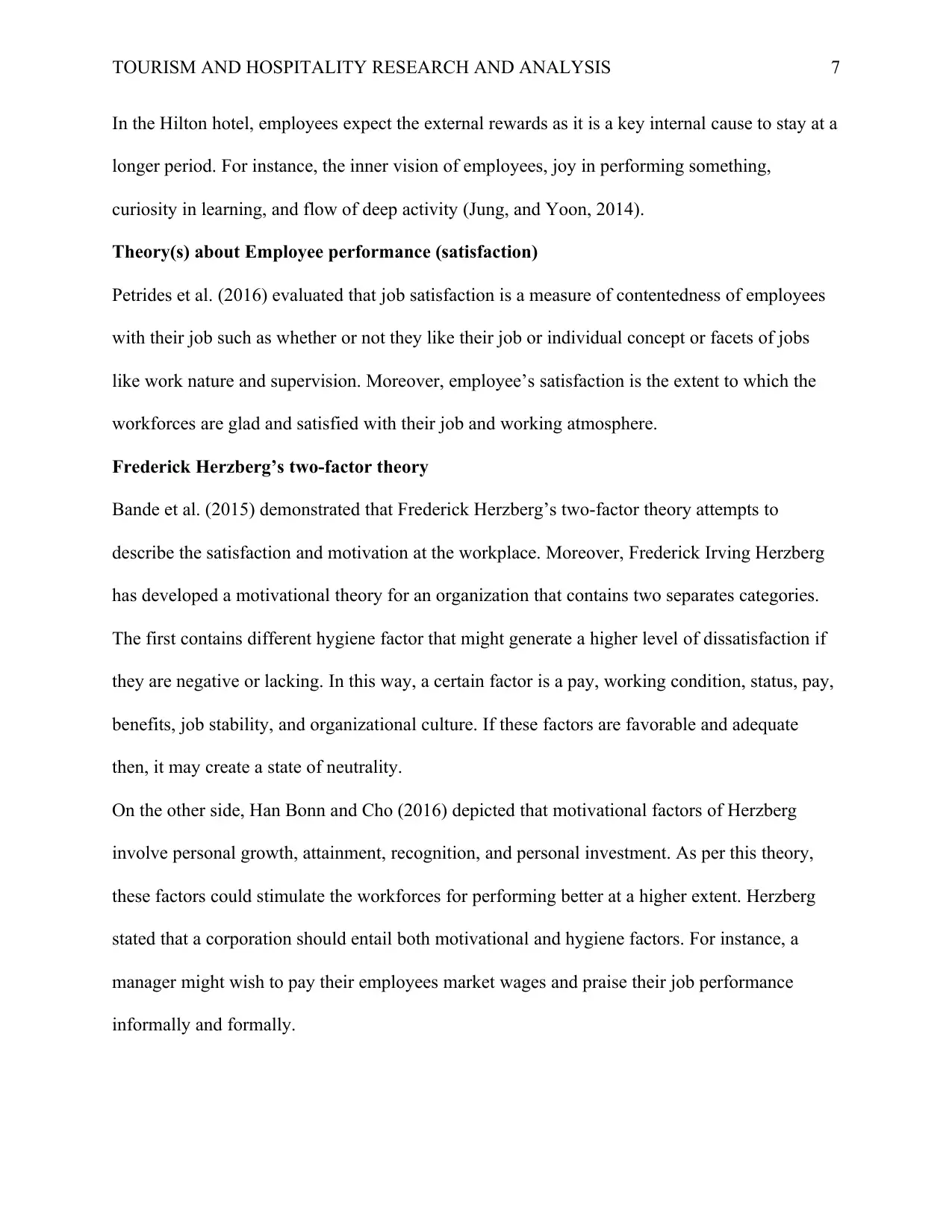
TOURISM AND HOSPITALITY RESEARCH AND ANALYSIS 7
In the Hilton hotel, employees expect the external rewards as it is a key internal cause to stay at a
longer period. For instance, the inner vision of employees, joy in performing something,
curiosity in learning, and flow of deep activity (Jung, and Yoon, 2014).
Theory(s) about Employee performance (satisfaction)
Petrides et al. (2016) evaluated that job satisfaction is a measure of contentedness of employees
with their job such as whether or not they like their job or individual concept or facets of jobs
like work nature and supervision. Moreover, employee’s satisfaction is the extent to which the
workforces are glad and satisfied with their job and working atmosphere.
Frederick Herzberg’s two-factor theory
Bande et al. (2015) demonstrated that Frederick Herzberg’s two-factor theory attempts to
describe the satisfaction and motivation at the workplace. Moreover, Frederick Irving Herzberg
has developed a motivational theory for an organization that contains two separates categories.
The first contains different hygiene factor that might generate a higher level of dissatisfaction if
they are negative or lacking. In this way, a certain factor is a pay, working condition, status, pay,
benefits, job stability, and organizational culture. If these factors are favorable and adequate
then, it may create a state of neutrality.
On the other side, Han Bonn and Cho (2016) depicted that motivational factors of Herzberg
involve personal growth, attainment, recognition, and personal investment. As per this theory,
these factors could stimulate the workforces for performing better at a higher extent. Herzberg
stated that a corporation should entail both motivational and hygiene factors. For instance, a
manager might wish to pay their employees market wages and praise their job performance
informally and formally.
In the Hilton hotel, employees expect the external rewards as it is a key internal cause to stay at a
longer period. For instance, the inner vision of employees, joy in performing something,
curiosity in learning, and flow of deep activity (Jung, and Yoon, 2014).
Theory(s) about Employee performance (satisfaction)
Petrides et al. (2016) evaluated that job satisfaction is a measure of contentedness of employees
with their job such as whether or not they like their job or individual concept or facets of jobs
like work nature and supervision. Moreover, employee’s satisfaction is the extent to which the
workforces are glad and satisfied with their job and working atmosphere.
Frederick Herzberg’s two-factor theory
Bande et al. (2015) demonstrated that Frederick Herzberg’s two-factor theory attempts to
describe the satisfaction and motivation at the workplace. Moreover, Frederick Irving Herzberg
has developed a motivational theory for an organization that contains two separates categories.
The first contains different hygiene factor that might generate a higher level of dissatisfaction if
they are negative or lacking. In this way, a certain factor is a pay, working condition, status, pay,
benefits, job stability, and organizational culture. If these factors are favorable and adequate
then, it may create a state of neutrality.
On the other side, Han Bonn and Cho (2016) depicted that motivational factors of Herzberg
involve personal growth, attainment, recognition, and personal investment. As per this theory,
these factors could stimulate the workforces for performing better at a higher extent. Herzberg
stated that a corporation should entail both motivational and hygiene factors. For instance, a
manager might wish to pay their employees market wages and praise their job performance
informally and formally.
Paraphrase This Document
Need a fresh take? Get an instant paraphrase of this document with our AI Paraphraser
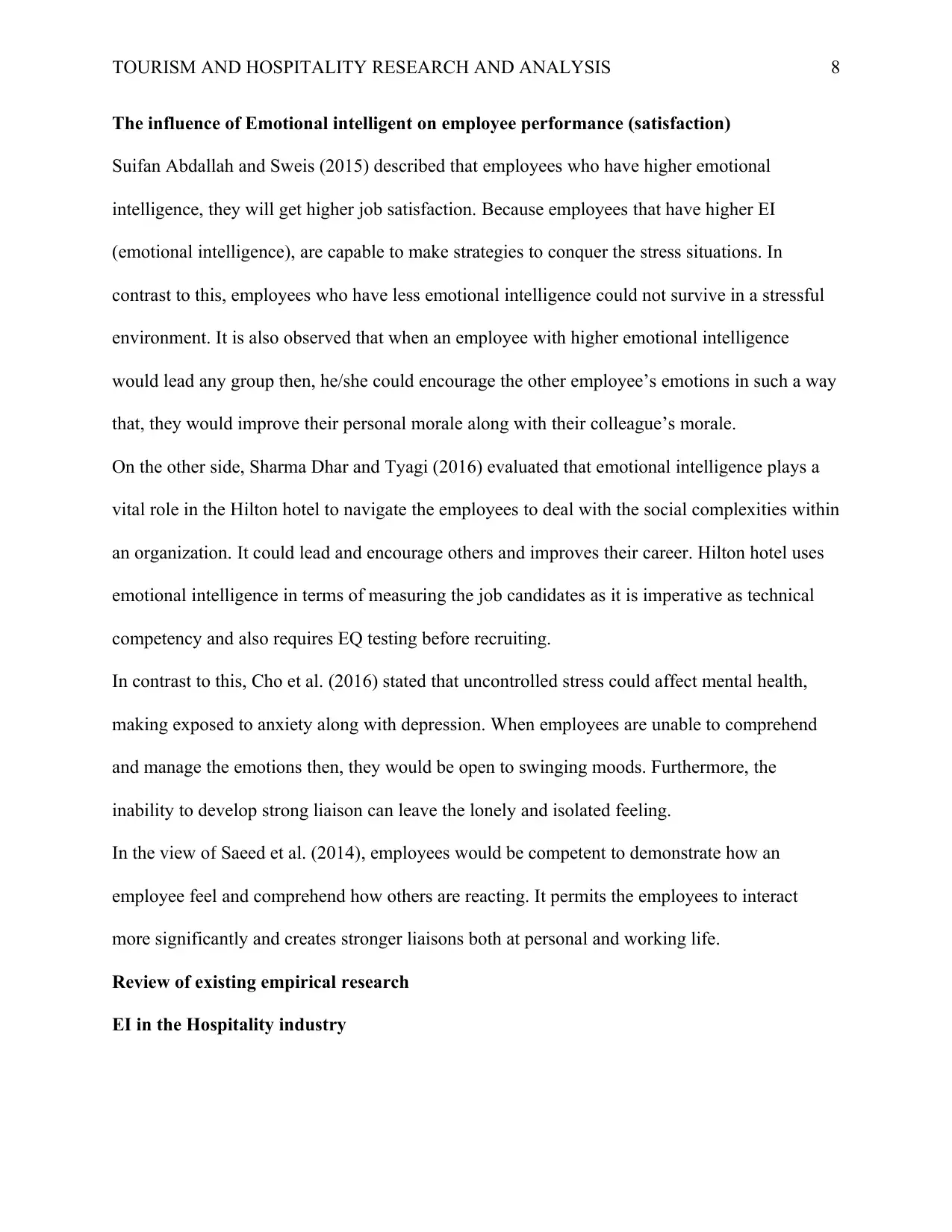
TOURISM AND HOSPITALITY RESEARCH AND ANALYSIS 8
The influence of Emotional intelligent on employee performance (satisfaction)
Suifan Abdallah and Sweis (2015) described that employees who have higher emotional
intelligence, they will get higher job satisfaction. Because employees that have higher EI
(emotional intelligence), are capable to make strategies to conquer the stress situations. In
contrast to this, employees who have less emotional intelligence could not survive in a stressful
environment. It is also observed that when an employee with higher emotional intelligence
would lead any group then, he/she could encourage the other employee’s emotions in such a way
that, they would improve their personal morale along with their colleague’s morale.
On the other side, Sharma Dhar and Tyagi (2016) evaluated that emotional intelligence plays a
vital role in the Hilton hotel to navigate the employees to deal with the social complexities within
an organization. It could lead and encourage others and improves their career. Hilton hotel uses
emotional intelligence in terms of measuring the job candidates as it is imperative as technical
competency and also requires EQ testing before recruiting.
In contrast to this, Cho et al. (2016) stated that uncontrolled stress could affect mental health,
making exposed to anxiety along with depression. When employees are unable to comprehend
and manage the emotions then, they would be open to swinging moods. Furthermore, the
inability to develop strong liaison can leave the lonely and isolated feeling.
In the view of Saeed et al. (2014), employees would be competent to demonstrate how an
employee feel and comprehend how others are reacting. It permits the employees to interact
more significantly and creates stronger liaisons both at personal and working life.
Review of existing empirical research
EI in the Hospitality industry
The influence of Emotional intelligent on employee performance (satisfaction)
Suifan Abdallah and Sweis (2015) described that employees who have higher emotional
intelligence, they will get higher job satisfaction. Because employees that have higher EI
(emotional intelligence), are capable to make strategies to conquer the stress situations. In
contrast to this, employees who have less emotional intelligence could not survive in a stressful
environment. It is also observed that when an employee with higher emotional intelligence
would lead any group then, he/she could encourage the other employee’s emotions in such a way
that, they would improve their personal morale along with their colleague’s morale.
On the other side, Sharma Dhar and Tyagi (2016) evaluated that emotional intelligence plays a
vital role in the Hilton hotel to navigate the employees to deal with the social complexities within
an organization. It could lead and encourage others and improves their career. Hilton hotel uses
emotional intelligence in terms of measuring the job candidates as it is imperative as technical
competency and also requires EQ testing before recruiting.
In contrast to this, Cho et al. (2016) stated that uncontrolled stress could affect mental health,
making exposed to anxiety along with depression. When employees are unable to comprehend
and manage the emotions then, they would be open to swinging moods. Furthermore, the
inability to develop strong liaison can leave the lonely and isolated feeling.
In the view of Saeed et al. (2014), employees would be competent to demonstrate how an
employee feel and comprehend how others are reacting. It permits the employees to interact
more significantly and creates stronger liaisons both at personal and working life.
Review of existing empirical research
EI in the Hospitality industry
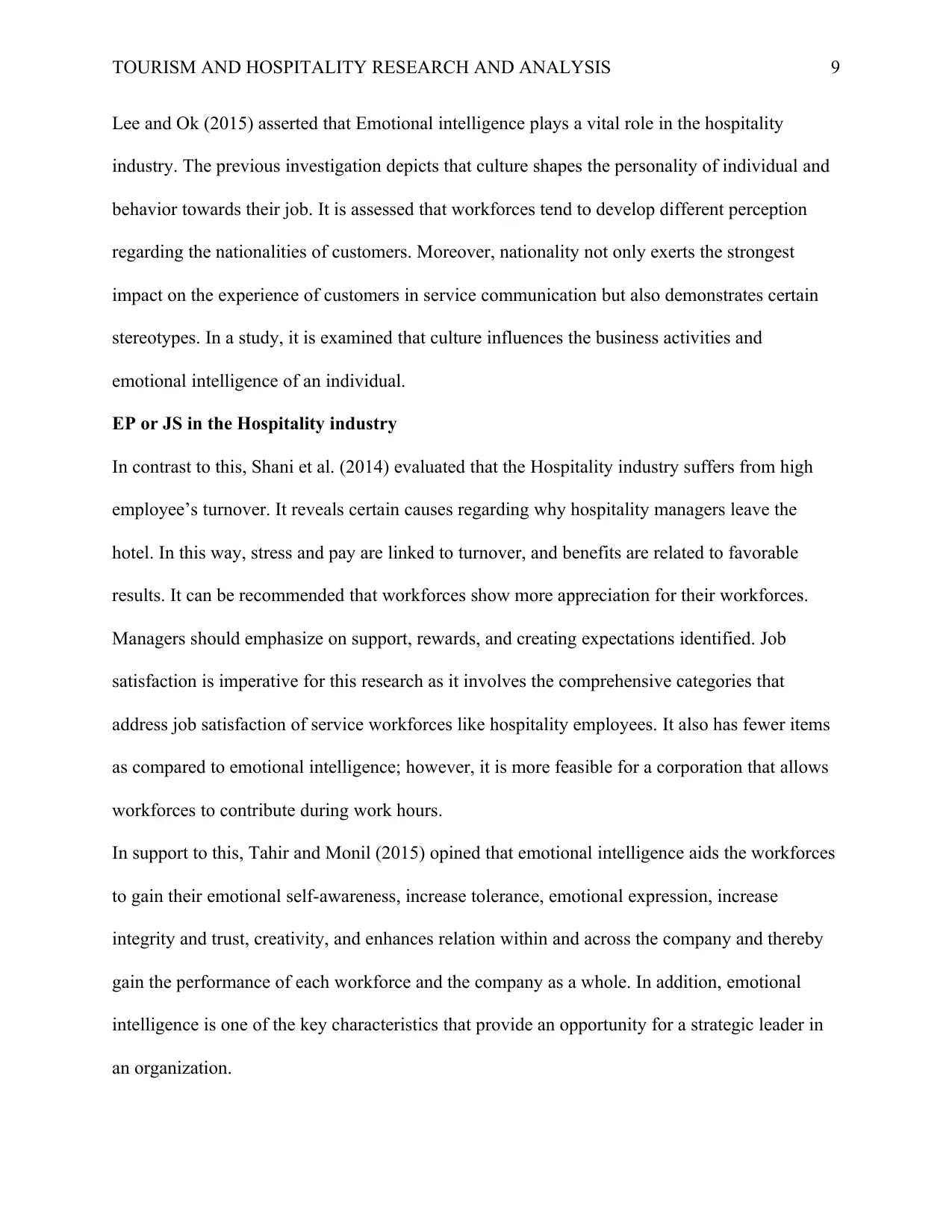
TOURISM AND HOSPITALITY RESEARCH AND ANALYSIS 9
Lee and Ok (2015) asserted that Emotional intelligence plays a vital role in the hospitality
industry. The previous investigation depicts that culture shapes the personality of individual and
behavior towards their job. It is assessed that workforces tend to develop different perception
regarding the nationalities of customers. Moreover, nationality not only exerts the strongest
impact on the experience of customers in service communication but also demonstrates certain
stereotypes. In a study, it is examined that culture influences the business activities and
emotional intelligence of an individual.
EP or JS in the Hospitality industry
In contrast to this, Shani et al. (2014) evaluated that the Hospitality industry suffers from high
employee’s turnover. It reveals certain causes regarding why hospitality managers leave the
hotel. In this way, stress and pay are linked to turnover, and benefits are related to favorable
results. It can be recommended that workforces show more appreciation for their workforces.
Managers should emphasize on support, rewards, and creating expectations identified. Job
satisfaction is imperative for this research as it involves the comprehensive categories that
address job satisfaction of service workforces like hospitality employees. It also has fewer items
as compared to emotional intelligence; however, it is more feasible for a corporation that allows
workforces to contribute during work hours.
In support to this, Tahir and Monil (2015) opined that emotional intelligence aids the workforces
to gain their emotional self-awareness, increase tolerance, emotional expression, increase
integrity and trust, creativity, and enhances relation within and across the company and thereby
gain the performance of each workforce and the company as a whole. In addition, emotional
intelligence is one of the key characteristics that provide an opportunity for a strategic leader in
an organization.
Lee and Ok (2015) asserted that Emotional intelligence plays a vital role in the hospitality
industry. The previous investigation depicts that culture shapes the personality of individual and
behavior towards their job. It is assessed that workforces tend to develop different perception
regarding the nationalities of customers. Moreover, nationality not only exerts the strongest
impact on the experience of customers in service communication but also demonstrates certain
stereotypes. In a study, it is examined that culture influences the business activities and
emotional intelligence of an individual.
EP or JS in the Hospitality industry
In contrast to this, Shani et al. (2014) evaluated that the Hospitality industry suffers from high
employee’s turnover. It reveals certain causes regarding why hospitality managers leave the
hotel. In this way, stress and pay are linked to turnover, and benefits are related to favorable
results. It can be recommended that workforces show more appreciation for their workforces.
Managers should emphasize on support, rewards, and creating expectations identified. Job
satisfaction is imperative for this research as it involves the comprehensive categories that
address job satisfaction of service workforces like hospitality employees. It also has fewer items
as compared to emotional intelligence; however, it is more feasible for a corporation that allows
workforces to contribute during work hours.
In support to this, Tahir and Monil (2015) opined that emotional intelligence aids the workforces
to gain their emotional self-awareness, increase tolerance, emotional expression, increase
integrity and trust, creativity, and enhances relation within and across the company and thereby
gain the performance of each workforce and the company as a whole. In addition, emotional
intelligence is one of the key characteristics that provide an opportunity for a strategic leader in
an organization.
⊘ This is a preview!⊘
Do you want full access?
Subscribe today to unlock all pages.

Trusted by 1+ million students worldwide
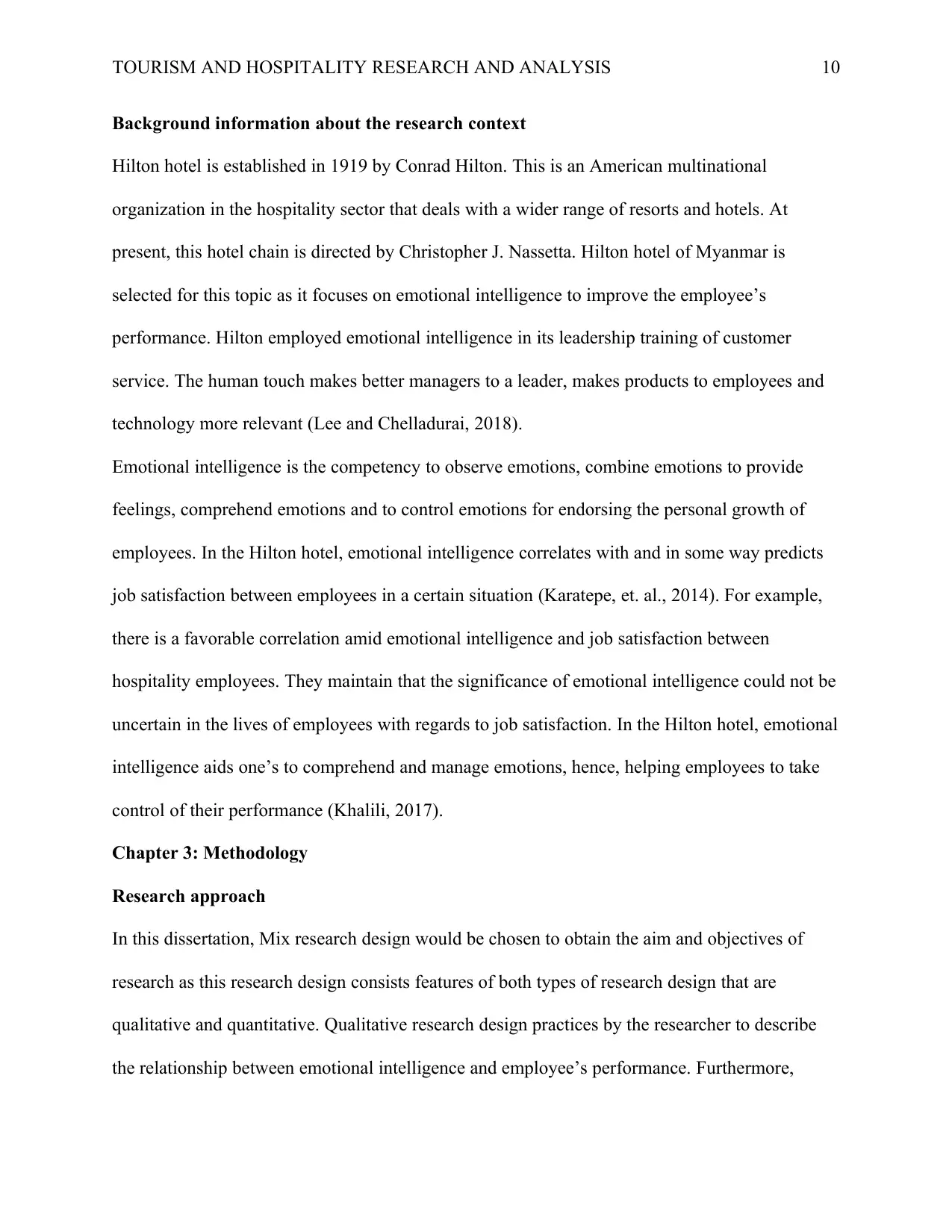
TOURISM AND HOSPITALITY RESEARCH AND ANALYSIS 10
Background information about the research context
Hilton hotel is established in 1919 by Conrad Hilton. This is an American multinational
organization in the hospitality sector that deals with a wider range of resorts and hotels. At
present, this hotel chain is directed by Christopher J. Nassetta. Hilton hotel of Myanmar is
selected for this topic as it focuses on emotional intelligence to improve the employee’s
performance. Hilton employed emotional intelligence in its leadership training of customer
service. The human touch makes better managers to a leader, makes products to employees and
technology more relevant (Lee and Chelladurai, 2018).
Emotional intelligence is the competency to observe emotions, combine emotions to provide
feelings, comprehend emotions and to control emotions for endorsing the personal growth of
employees. In the Hilton hotel, emotional intelligence correlates with and in some way predicts
job satisfaction between employees in a certain situation (Karatepe, et. al., 2014). For example,
there is a favorable correlation amid emotional intelligence and job satisfaction between
hospitality employees. They maintain that the significance of emotional intelligence could not be
uncertain in the lives of employees with regards to job satisfaction. In the Hilton hotel, emotional
intelligence aids one’s to comprehend and manage emotions, hence, helping employees to take
control of their performance (Khalili, 2017).
Chapter 3: Methodology
Research approach
In this dissertation, Mix research design would be chosen to obtain the aim and objectives of
research as this research design consists features of both types of research design that are
qualitative and quantitative. Qualitative research design practices by the researcher to describe
the relationship between emotional intelligence and employee’s performance. Furthermore,
Background information about the research context
Hilton hotel is established in 1919 by Conrad Hilton. This is an American multinational
organization in the hospitality sector that deals with a wider range of resorts and hotels. At
present, this hotel chain is directed by Christopher J. Nassetta. Hilton hotel of Myanmar is
selected for this topic as it focuses on emotional intelligence to improve the employee’s
performance. Hilton employed emotional intelligence in its leadership training of customer
service. The human touch makes better managers to a leader, makes products to employees and
technology more relevant (Lee and Chelladurai, 2018).
Emotional intelligence is the competency to observe emotions, combine emotions to provide
feelings, comprehend emotions and to control emotions for endorsing the personal growth of
employees. In the Hilton hotel, emotional intelligence correlates with and in some way predicts
job satisfaction between employees in a certain situation (Karatepe, et. al., 2014). For example,
there is a favorable correlation amid emotional intelligence and job satisfaction between
hospitality employees. They maintain that the significance of emotional intelligence could not be
uncertain in the lives of employees with regards to job satisfaction. In the Hilton hotel, emotional
intelligence aids one’s to comprehend and manage emotions, hence, helping employees to take
control of their performance (Khalili, 2017).
Chapter 3: Methodology
Research approach
In this dissertation, Mix research design would be chosen to obtain the aim and objectives of
research as this research design consists features of both types of research design that are
qualitative and quantitative. Qualitative research design practices by the researcher to describe
the relationship between emotional intelligence and employee’s performance. Furthermore,
Paraphrase This Document
Need a fresh take? Get an instant paraphrase of this document with our AI Paraphraser
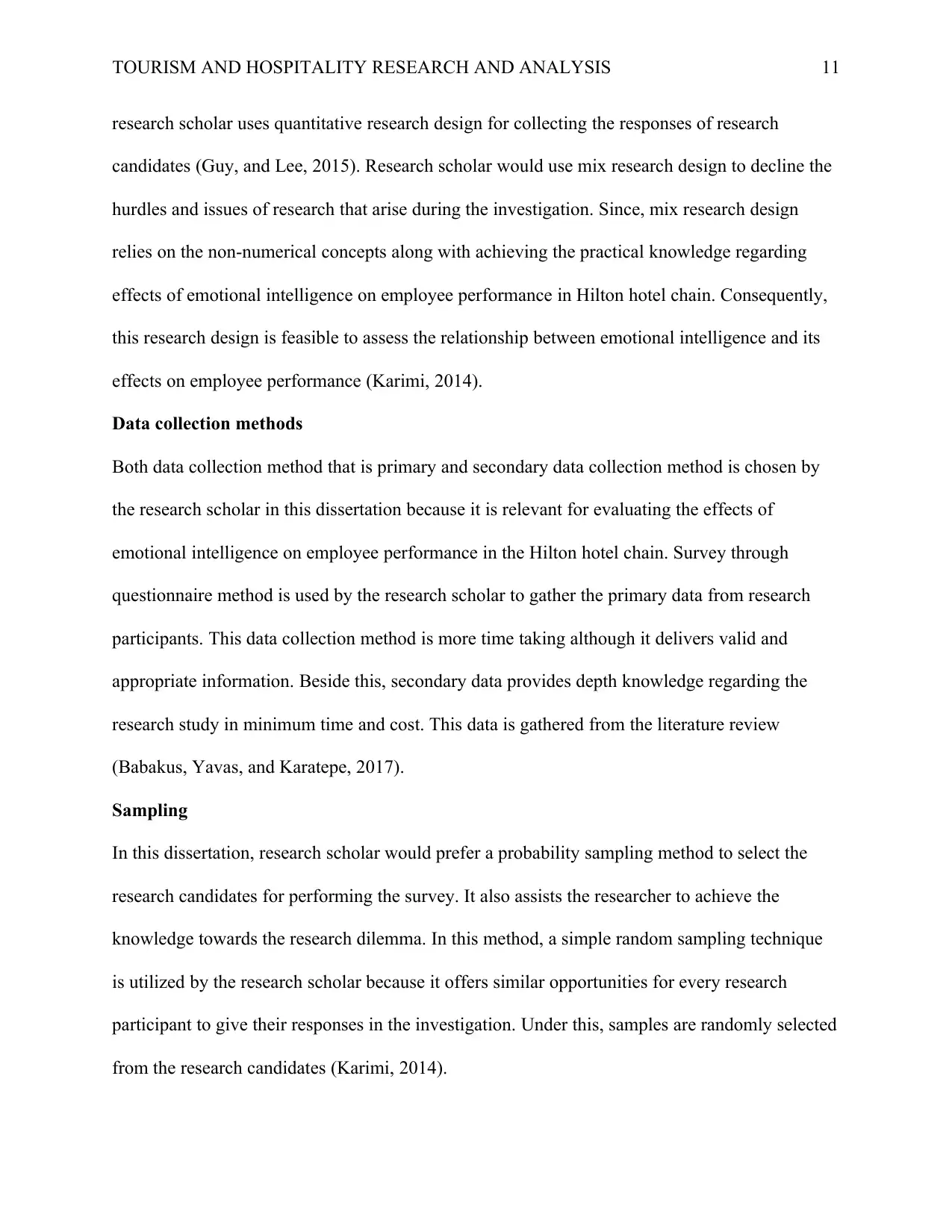
TOURISM AND HOSPITALITY RESEARCH AND ANALYSIS 11
research scholar uses quantitative research design for collecting the responses of research
candidates (Guy, and Lee, 2015). Research scholar would use mix research design to decline the
hurdles and issues of research that arise during the investigation. Since, mix research design
relies on the non-numerical concepts along with achieving the practical knowledge regarding
effects of emotional intelligence on employee performance in Hilton hotel chain. Consequently,
this research design is feasible to assess the relationship between emotional intelligence and its
effects on employee performance (Karimi, 2014).
Data collection methods
Both data collection method that is primary and secondary data collection method is chosen by
the research scholar in this dissertation because it is relevant for evaluating the effects of
emotional intelligence on employee performance in the Hilton hotel chain. Survey through
questionnaire method is used by the research scholar to gather the primary data from research
participants. This data collection method is more time taking although it delivers valid and
appropriate information. Beside this, secondary data provides depth knowledge regarding the
research study in minimum time and cost. This data is gathered from the literature review
(Babakus, Yavas, and Karatepe, 2017).
Sampling
In this dissertation, research scholar would prefer a probability sampling method to select the
research candidates for performing the survey. It also assists the researcher to achieve the
knowledge towards the research dilemma. In this method, a simple random sampling technique
is utilized by the research scholar because it offers similar opportunities for every research
participant to give their responses in the investigation. Under this, samples are randomly selected
from the research candidates (Karimi, 2014).
research scholar uses quantitative research design for collecting the responses of research
candidates (Guy, and Lee, 2015). Research scholar would use mix research design to decline the
hurdles and issues of research that arise during the investigation. Since, mix research design
relies on the non-numerical concepts along with achieving the practical knowledge regarding
effects of emotional intelligence on employee performance in Hilton hotel chain. Consequently,
this research design is feasible to assess the relationship between emotional intelligence and its
effects on employee performance (Karimi, 2014).
Data collection methods
Both data collection method that is primary and secondary data collection method is chosen by
the research scholar in this dissertation because it is relevant for evaluating the effects of
emotional intelligence on employee performance in the Hilton hotel chain. Survey through
questionnaire method is used by the research scholar to gather the primary data from research
participants. This data collection method is more time taking although it delivers valid and
appropriate information. Beside this, secondary data provides depth knowledge regarding the
research study in minimum time and cost. This data is gathered from the literature review
(Babakus, Yavas, and Karatepe, 2017).
Sampling
In this dissertation, research scholar would prefer a probability sampling method to select the
research candidates for performing the survey. It also assists the researcher to achieve the
knowledge towards the research dilemma. In this method, a simple random sampling technique
is utilized by the research scholar because it offers similar opportunities for every research
participant to give their responses in the investigation. Under this, samples are randomly selected
from the research candidates (Karimi, 2014).
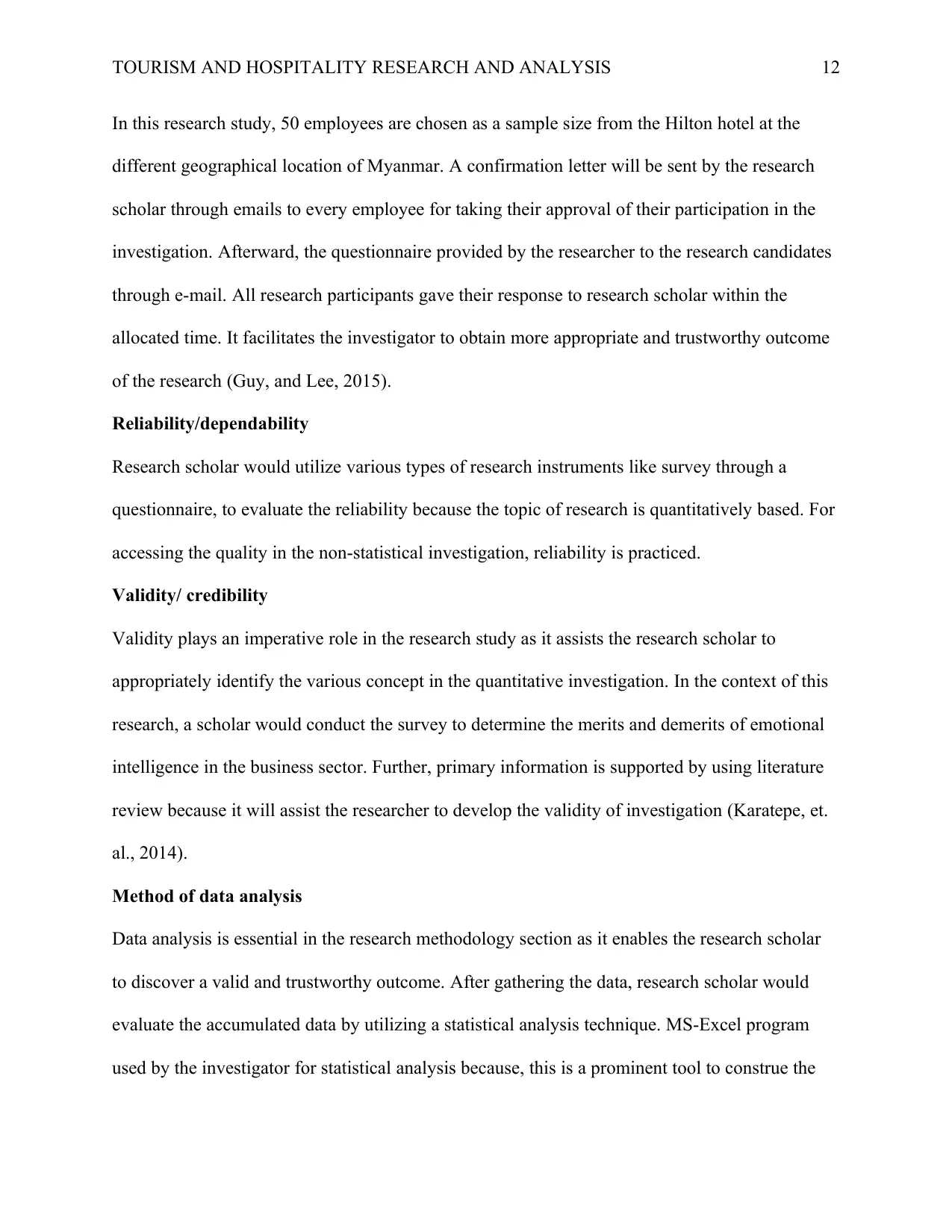
TOURISM AND HOSPITALITY RESEARCH AND ANALYSIS 12
In this research study, 50 employees are chosen as a sample size from the Hilton hotel at the
different geographical location of Myanmar. A confirmation letter will be sent by the research
scholar through emails to every employee for taking their approval of their participation in the
investigation. Afterward, the questionnaire provided by the researcher to the research candidates
through e-mail. All research participants gave their response to research scholar within the
allocated time. It facilitates the investigator to obtain more appropriate and trustworthy outcome
of the research (Guy, and Lee, 2015).
Reliability/dependability
Research scholar would utilize various types of research instruments like survey through a
questionnaire, to evaluate the reliability because the topic of research is quantitatively based. For
accessing the quality in the non-statistical investigation, reliability is practiced.
Validity/ credibility
Validity plays an imperative role in the research study as it assists the research scholar to
appropriately identify the various concept in the quantitative investigation. In the context of this
research, a scholar would conduct the survey to determine the merits and demerits of emotional
intelligence in the business sector. Further, primary information is supported by using literature
review because it will assist the researcher to develop the validity of investigation (Karatepe, et.
al., 2014).
Method of data analysis
Data analysis is essential in the research methodology section as it enables the research scholar
to discover a valid and trustworthy outcome. After gathering the data, research scholar would
evaluate the accumulated data by utilizing a statistical analysis technique. MS-Excel program
used by the investigator for statistical analysis because, this is a prominent tool to construe the
In this research study, 50 employees are chosen as a sample size from the Hilton hotel at the
different geographical location of Myanmar. A confirmation letter will be sent by the research
scholar through emails to every employee for taking their approval of their participation in the
investigation. Afterward, the questionnaire provided by the researcher to the research candidates
through e-mail. All research participants gave their response to research scholar within the
allocated time. It facilitates the investigator to obtain more appropriate and trustworthy outcome
of the research (Guy, and Lee, 2015).
Reliability/dependability
Research scholar would utilize various types of research instruments like survey through a
questionnaire, to evaluate the reliability because the topic of research is quantitatively based. For
accessing the quality in the non-statistical investigation, reliability is practiced.
Validity/ credibility
Validity plays an imperative role in the research study as it assists the research scholar to
appropriately identify the various concept in the quantitative investigation. In the context of this
research, a scholar would conduct the survey to determine the merits and demerits of emotional
intelligence in the business sector. Further, primary information is supported by using literature
review because it will assist the researcher to develop the validity of investigation (Karatepe, et.
al., 2014).
Method of data analysis
Data analysis is essential in the research methodology section as it enables the research scholar
to discover a valid and trustworthy outcome. After gathering the data, research scholar would
evaluate the accumulated data by utilizing a statistical analysis technique. MS-Excel program
used by the investigator for statistical analysis because, this is a prominent tool to construe the
⊘ This is a preview!⊘
Do you want full access?
Subscribe today to unlock all pages.

Trusted by 1+ million students worldwide
1 out of 21
Related Documents
Your All-in-One AI-Powered Toolkit for Academic Success.
+13062052269
info@desklib.com
Available 24*7 on WhatsApp / Email
![[object Object]](/_next/static/media/star-bottom.7253800d.svg)
Unlock your academic potential
Copyright © 2020–2026 A2Z Services. All Rights Reserved. Developed and managed by ZUCOL.





